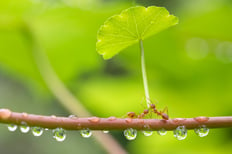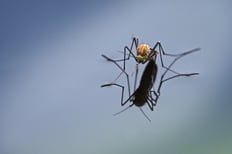Think pests in New England take a break when it rains? Think again.
We're all familiar with the saying "April showers bring May flowers", and the weather over the next couple of days certainly seems prepared to deliver. While we look forward to the greenery and blooming plants to come, there's one other thing April showers bring that we aren't too keen on: Lots of pests.
For us, a rainy day is little more than a dreary obstacle to overcome, but for some pests, it's a life or death situation. Pests have a love-hate relationship with water: While most require water to survive or even to reproduce, the fact remains that rain can flood their homes, send their food sources running for cover, and force them into places they’d rather not be—like our homes. Here are some of the New England pests you’re likely to see during and after the rain.
 Ants. Because many ant species build their colonies in the ground, even a small amount of rain can cause a big problem. To escape flooding, ants must head for higher, drier areas, and your home can be an extremely appealing option. Inside your house, they’ll have shelter and food sources— and if they find it cozy enough, they may not want to leave after the skies clear.
Ants. Because many ant species build their colonies in the ground, even a small amount of rain can cause a big problem. To escape flooding, ants must head for higher, drier areas, and your home can be an extremely appealing option. Inside your house, they’ll have shelter and food sources— and if they find it cozy enough, they may not want to leave after the skies clear.
Centipedes. Centipedes prefer the damp. They’re attracted to dark, humid environments with an available food source. Centipedes are predators that will essentially eat anything smaller than they are—and that includes other pests that might be hunkering down in your house. If the prey is moving indoors, the centipedes will follow.

Mosquitoes. A thimbleful of water is all mosquitoes need to breed. Rainwater left stagnant in gutters, bird baths, pools, gardening equipment, pet bowls, even tarps, is perfect for a female mosquito to lay her (up to 300) eggs. Larva only need half an inch of water to survive, so even a light rain can increase mosquito activity in your yard.
Termites. Termites require specific amounts of moisture to thrive, which is a large part of why termites often swarm after a warm rainfall. Damp soil cues reproductive termites to pair off and burrow underground to begin a new colony. Rain also contributes to water damage and damp wood in homes, providing a highly palatable food source.
We’re not trying to rain on your parade, but the truth is, pests are going to be afoot even when it’s damp out. On the bright side, Burgess Pest is here to help. We've got a plan for any kind of weather, any time of year.


